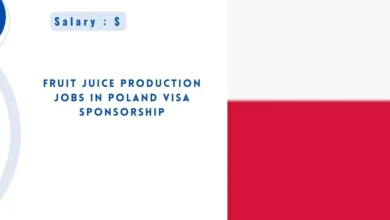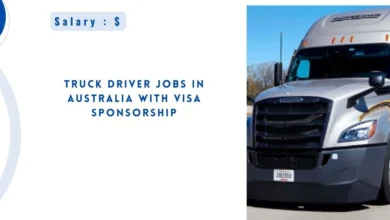German Opportunity Card Accepting Job Applications
The Chancenkarte, also known as the Germany Opportunity Card, is a novel form of residence card that is designed to attract qualified workers from outside the European Union to Germany. This novel visa will enable individuals to enter Germany and pursue employment for a period of up to one year, regardless of whether they have received a job offer. This article discusses the purpose of the Opportunity Card, the eligibility requirements, the advantages of the card, its distinctions from other German work visas, and the process of applying for one.
Check Also: Hotel Receptionist Jobs in Germany 2025 – Apply Now
Purpose of German Opportunity Card
The main goal of the Germany Opportunity Card is to bring skilled workers from all over the world to Germany to help with its labor issues. Germany wants to improve its economy, hire more people, and keep its strong edge in many fields by making it easier for people to get jobs.
Benefits of German Opportunity Card Accepting Job Applications
People who have an Opportunity Card can get a lot of perks, such as:
- Flexibility: Holders can work up to 20 hours a week as part-time jobs while they look for full-time jobs.
- Recognition of Foreign Qualifications: The program takes into account job experience and qualifications from other countries.
- Way to Residency: If the holder can find suitable work, they can apply for a longer-term residence card.
Eligibility Criteria
To be eligible for the Opportunity Card, you need at least 6 points, which are calculated by a points system. Here’s how the points are given:
- Qualifications: University degree: 3 points and two years of vocational training: 2 points
- Professional Experience: Two years of professional experience, preceded by vocational training: 2 points
- Language Skills: German (Level above B2): 3 points, German (Level A2): 1 point, and English (Level C1): 1 point
- Age: Below 35 years: 2 points, Between 36 and 40 years: 1 point
- Previous Stay in Germany: At least six months within the last five years (excluding tourism): 1 point
- Spouse’s Eligibility: If the spouse also meets the requirements for the Opportunity Card: 1 point
- Profession in Demand: Qualified skills in a bottleneck profession: 1 point
How It Opportunity Card Differ from Other German Work Visas?
There are a few main ways in which the Opportunity Card is different from regular German work visas:
- Job Offer Not Required: For most work visas, you need to have a signed job offer before you can apply. With the Opportunity Card, you can enter Germany and look for work for up to a year. This gives people who are looking for work more options and more freedom.
- Points-Based System: The Opportunity Card uses a points-based system to decide who is eligible, taking into account things like age, work experience, education, and language skills. This is different from some visas, which may only look at certain job offers or skills.
- Focus on Potential: The Opportunity Card focuses on what skilled people could do to help the German economy, not just what jobs they have right now. This gives people who have important skills but haven’t found a job yet more options.
- Pathway to Residence: Job hunters who are successful can move from an Opportunity Card to a longer-term residence pass, which makes it easier to settle down in Germany. This is not the same as temporary work visas, which might not make it clear how to become a permanent resident.
- Flexibility for Part-Time Work: People with an Opportunity Card can work part-time (up to 20 hours per week) while they look for work, which helps them make money while they look. With some job visas, this isn’t always possible.
Comparison of German Opportunity Card VS Blue Card and Job Seeker VISA
The chart below shows the main changes between the German opportunity card, the EU blue card, and the German job seeker visa:
| FEATURE | OPPORTUNITY CARD | EU BLUE CARD | JOB SEEKER VISA |
|---|---|---|---|
| Job offer required | No | Yes | No |
| Points-based system | Yes | No (but minimum salary threshold applies) | No |
| Focus | Potential contribution and skillset | Highly qualified professionals in specific fields | General job search in any field |
| Pathway to residence | Yes (upon finding qualified employment) | Yes (after a certain period of employment) | Possible, but less straightforward |
| Flexibility for part-time work | Yes (up to 20 hours per week) | Usually allowed with employer’s permission | Not explicitly allowed |
Step-by-Step Application Process to Apply for Opportunity Card
Here’s what you need to do to get a Germany Opportunity Card:
- Check Your Eligibility: Look over the points-based system and make sure you meet the bare minimum (6 points). There are online tools you can use, such as the one on Einwanderungsberater: www.einwanderungsberater.com
2# Gather Required Documents
- Valid passport
- Proof of skills, like a college degree or a certificate of vocational training.
- Employment contracts and recommendation letters are examples of proof of work experience.
- Certificates showing that you can speak German or English if asked.
- Proof that you can pay your bills, like bank records or a contract for a part-time job.
3# Apply Online or In-Person
- Online: Through the Consular Services Portal: https://digital.diplo.de/chancenkarte
- In-Person: At the German embassy or consulate in your country of origin.
4# Await Processing and Decision: The working time could change, so be ready for delays.
Conclusion
This is how the Germany Opportunity Card (https://chancenkarte.com/en/) is different from other work visa options: it gives skilled people a unique and open way to look for jobs in Germany. With its points-based system and focus on potential, it’s a great chance for skilled workers from outside of the EU to build a future in Germany and help the German economy.
Frequently Asked Questions
What is the Germany Opportunity Card?
The Chancenkarte, or Germany Opportunity Card, is a new residence permit for skilled non-EU workers. It lets them come to Germany and look for work for up to a year without a job offer.
What are the main benefits of the Germany Opportunity Card?
Some of the benefits are being able to work part-time (up to 20 hours per week) while looking for work, having foreign credentials recognized, and being able to move to the country permanently if you find a job.




